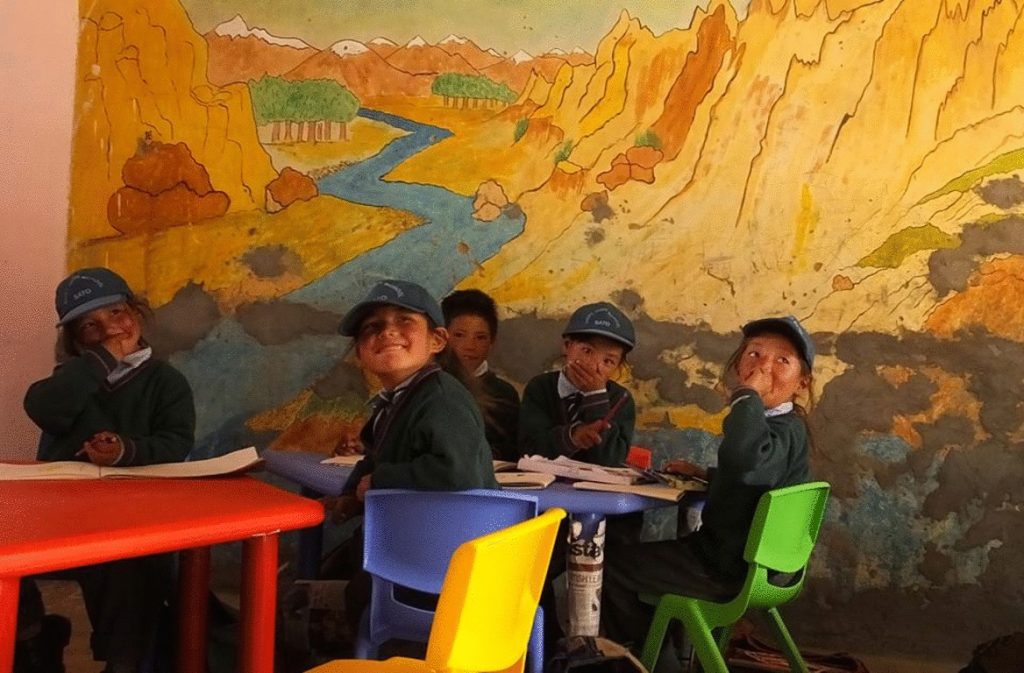17000ft Above the World: Sujata Sahu Revolutionizing Education

In the remote, high-altitude regions of the Himalayas, where the air is thin, and the landscape is breathtakingly rugged, education has long been a luxury rather than a right. Schools, if they exist, are often poorly equipped, teachers are scarce, and the harsh conditions make learning a daunting task for children.
Amidst these challenges, one woman, Sujata Sahu, has embarked on an extraordinary mission to revolutionize education in these isolated communities. Through her organization, the 17000 ft Foundation, Sahu is not only bringing hope to the children of the Himalayas but is also reshaping the future of entire generations.
The Journey Begins: From IT Professional to Social Entrepreneur
Sujata Sahu’s journey from a successful IT professional to a social entrepreneur began with a trek. In 2010, Sahu, who was working as a teacher at the time, embarked on a challenging trek through the remote villages of Ladakh, a region in the northernmost part of India. What she encountered on this journey was a stark contrast to her life in the bustling cities of India. The stunning beauty of the Himalayas was juxtaposed with the harsh realities of life at such altitudes—where basic amenities like water, electricity, and healthcare were hard to come by.
However, what struck Sahu the most was the state of education in these regions. Schools were few and far between, and those that did exist were often in dilapidated conditions. Children had to walk several kilometers each day, often in freezing temperatures, to attend classes. Teachers, when present, were overwhelmed by the lack of resources and support. The education system in these regions was on the brink of collapse, and the children were the ones paying the highest price.
This experience left a deep impact on Sahu. She realized that the children of these remote regions, despite their hardships, were eager to learn. They had the same dreams and aspirations as children anywhere else, but their circumstances were holding them back. Determined to make a difference, Sahu decided to take a leap of faith and dedicate herself to improving education in these high-altitude regions. Thus, the 17000 ft Foundation was born.
The 17000 ft Foundation: A Mission to Bridge the Gap
Founded in 2012, the 17000 ft Foundation was established with the goal of improving the quality of education and bringing better opportunities to children living in the most remote and inaccessible parts of India. The foundation’s name is a nod to the altitudes at which they operate, often in areas as high as 17,000 feet above sea level.
The foundation’s work is centered on three key areas: improving school infrastructure, enhancing the quality of education, and connecting these remote schools to the rest of the world through technology.

1. Improving School Infrastructure
One of the first challenges Sahu and her team faced was the dire state of the schools in these regions. Many schools were in such poor condition that they were barely functional. Buildings were often old and crumbling, classrooms lacked basic furniture, and there were no libraries or playgrounds. In some cases, schools didn’t even have proper roofs to shield the children from the elements.
The 17000 ft Foundation began by working with local communities to rebuild and refurbish these schools. They provided essential infrastructure, such as sturdy furniture, blackboards, and educational materials. Libraries were set up in schools, stocked with books that were both educational and engaging for children. Playgrounds were built to give children a space to play and engage in physical activities, which are crucial for their overall development.

In addition to physical infrastructure, the foundation also focused on improving the learning environment. Classrooms were made more child-friendly, with colorful walls and educational posters. The goal was to create a space where children would feel motivated and excited to learn.
2. Enhancing the Quality of Education
Improving infrastructure was only the first step. The next challenge was to enhance the quality of education being delivered in these remote schools. Many teachers in these regions were untrained and lacked the resources and support needed to provide quality education. The 17000 ft Foundation recognized that for lasting change, it was crucial to invest in teacher training and support.
The foundation introduced several teacher training programs aimed at equipping educators with the skills and knowledge needed to teach effectively in these challenging environments. These programs focused on modern teaching methodologies, classroom management, and the use of technology in education. The foundation also provided ongoing support to teachers through regular workshops and training sessions.
One of the most innovative initiatives introduced by the 17000 ft Foundation was the creation of customized teaching aids and materials tailored to the specific needs of these regions. These materials were designed to be engaging and relevant to the children’s lives, incorporating local culture and context. This approach not only made learning more relatable but also helped preserve the cultural heritage of the region.
3. Leveraging Technology to Connect and Empower
In today’s digital age, access to technology is essential for quality education. However, in the remote regions where the 17000 ft Foundation operates, technology was a luxury that many schools could not afford. Sahu and her team saw an opportunity to bridge this gap by introducing technology into these schools.
The foundation partnered with organizations and donors to provide solar-powered digital tablets, loaded with educational content, to schools in these remote regions. These tablets were a game-changer, providing children with access to a wealth of information and learning resources that were previously out of reach. Teachers were trained to use these devices effectively in the classroom, integrating technology into their teaching methods.
In addition to digital tablets, the foundation also worked on connecting these remote schools to the rest of the world through the internet. While setting up internet connections in such high-altitude regions was no easy task, it was a critical step in breaking down the isolation that these communities faced. By connecting these schools to the global network, the foundation opened up new opportunities for learning, collaboration, and cultural exchange.
4. Building Sustainable Communities Through Education
The 17000 ft Foundation’s work extends beyond just improving schools. The foundation is deeply committed to building sustainable communities through education. This involves working closely with local communities to ensure that the changes being implemented are sustainable and have a long-term impact.
One of the key strategies employed by the foundation is community involvement. Sahu and her team believe that for any educational initiative to be successful, it must have the support and involvement of the local community. The foundation works with local leaders, parents, and other stakeholders to identify the needs of the community and develop solutions that are tailored to those needs.
The foundation also focuses on empowering the community by providing training and resources to local people, enabling them to take ownership of the initiatives. For example, the foundation has trained local women to manage and maintain the libraries set up in schools, giving them a sense of pride and ownership in the project.
5. Impact and Achievements
Since its inception, the 17000 ft Foundation has made a significant impact on the lives of thousands of children and their communities. The foundation has reached over 200 villages in Ladakh and other remote regions, transforming more than 200 schools and benefiting over 25,000 children.
The foundation’s work has not only improved the quality of education but has also had a ripple effect on the entire community. With better education, children are more likely to stay in school, reducing dropout rates. The foundation’s initiatives have also helped improve the health and well-being of children, as schools are now better equipped to provide a safe and nurturing environment.

The introduction of technology has opened up new opportunities for these children, giving them access to information and resources that were previously out of reach. This has sparked a new sense of curiosity and ambition among the students, many of whom now aspire to pursue higher education and careers that were once unimaginable.
The foundation’s work has also been recognized at the national and international levels. Sujata Sahu has received numerous awards and accolades for her efforts, including being named one of India’s most influential women by several prestigious organizations.
Challenges and the Road Ahead
Despite the significant progress made by the 17000 ft Foundation, the road ahead is still challenging. The remote and harsh conditions of the regions where the foundation operates make it difficult to sustain and scale the initiatives. Weather conditions often disrupt plans, and the logistics of reaching these high-altitude villages are complex and costly.
Additionally, the foundation faces the challenge of ensuring that the changes being implemented are sustainable in the long run. This requires continuous support and monitoring, as well as the development of new strategies to adapt to the evolving needs of the community.
However, Sahu and her team remain undeterred. They are committed to expanding their reach and impacting more children and communities in the years to come. The foundation is exploring new partnerships and funding opportunities to scale its initiatives and bring its successful model to other remote regions of India.
Conclusion: A Beacon of Hope in the Himalayas
Sujata Sahu’s 17000 ft Foundation stands as a beacon of hope in the remote and often forgotten regions of the Himalayas. Through her unwavering dedication and innovative approach, Sahu has brought the light of education to some of the most isolated communities in the world. Her work has not only transformed the lives of thousands of children but has also shown that with determination and the right support, even the most challenging problems can be overcome.
The story of the 17000 ft Foundation is a testament to the power of education to change lives and build a better future. As the foundation continues its mission, it serves as an inspiration to others to take action and make a difference, no matter how daunting the task may seem. In the words of Sujata Sahu, “If we can bring education to the highest and remotest parts of the world, then there is hope for every child, everywhere.”


